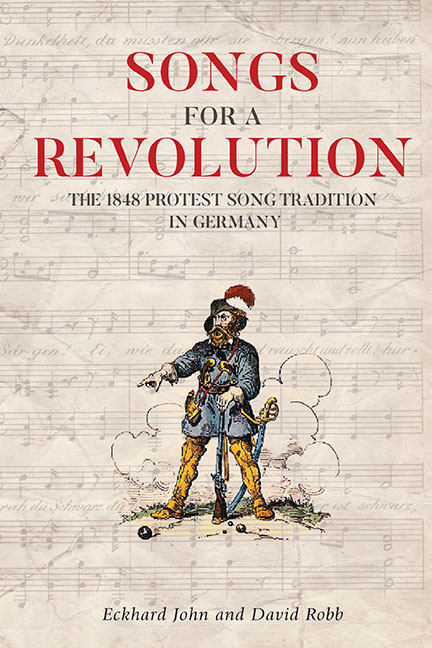Book contents
- Frontmatter
- Contents
- Preface
- Introduction: The Emergence of Political Song 1830–48
- Part I Before 1848: The Vormärz
- Part II 1848–49
- Part III 1848 in Memory
- Conclusion: The Making of Tradition; The Protest Songs of 1848 in the German Folk Revival 303
- Bibliography
- Discography
- Index of Names and Terms
- Index of Song Titles
Introduction: The Emergence of Political Song 1830–48
Published online by Cambridge University Press: 23 October 2020
- Frontmatter
- Contents
- Preface
- Introduction: The Emergence of Political Song 1830–48
- Part I Before 1848: The Vormärz
- Part II 1848–49
- Part III 1848 in Memory
- Conclusion: The Making of Tradition; The Protest Songs of 1848 in the German Folk Revival 303
- Bibliography
- Discography
- Index of Names and Terms
- Index of Song Titles
Summary
FRIEDRICH HECKER, one of the most prominent radical democratic spokesmen of 1848, was convinced that the political song was of primary significance “für das Handeln in der Gegenwart” (for action in the present) and emphasized that
nur wer, wie Goethe, ein Fürstendiener war und die Geschöpfe der Erde in Herrscher und Beherrschte eintheilte, konnte den schamlosen Satz aufstellen: “ein politisch Lied, ein garstig Lied.” Das politische Lied ist die Harmonie von Kopf und Herz in Bezug auf die höchsten Ideen der Menschheit. Freiheit, Recht, Vaterland, Menschenwürde, alles Große und Erhabene birgt zauberisch sein Schoß.
[only he who, like Goethe, was a servant of nobility and divided the world's creatures into the rulers and the ruled, could come up with the shameless line: “a political song, a nasty song.” The political song represents the harmony of head and heart in relation to the highest ideas of humanity. It magically encompasses freedom, justice, Fatherland, human dignity—indeed all that is great and exalted.]
The fact that a leading figure of the democratic movement of 1848 valued ideals such as freedom and justice so highly is much less surprising than the circumstance that a revolutionary activist should be concerned with the topic “das politische Lied.” In this respect it is noticeable that Hecker formulated his high regard for the political song genre by explicitly distancing himself from the sentiment of Goethe's dictum “ein politisch Lied, ein garstig Lied.” This clash of perspectives refers paradigmatically to a field of discourse that was changing fundamentally in the period between 1790 and 1848: from the pejorative understanding of the term “das politische Lied” in the time of Goethe to its emphatically positive evaluation by critical minds like Hecker.
Like no other ascription, the pithy phrase “ein politisch Lied, ein garstig Lied” shaped the subsequent understanding of political song and the discourse associated with it in the German-speaking world—up until far into the second half of the twentieth century. It has its roots in Goethe's Faust (1790), where the following line appears in the context of a lively singing scene in Auerbach's cellar: “Ein garstig Lied! Pfuy! ein politisch Lied! Ein leidig Lied!” (A nasty song! Ugh! A political song! A tiresome song!).
- Type
- Chapter
- Information
- Songs for a RevolutionThe 1848 Protest Song Tradition in Germany, pp. 1 - 26Publisher: Boydell & BrewerPrint publication year: 2020

